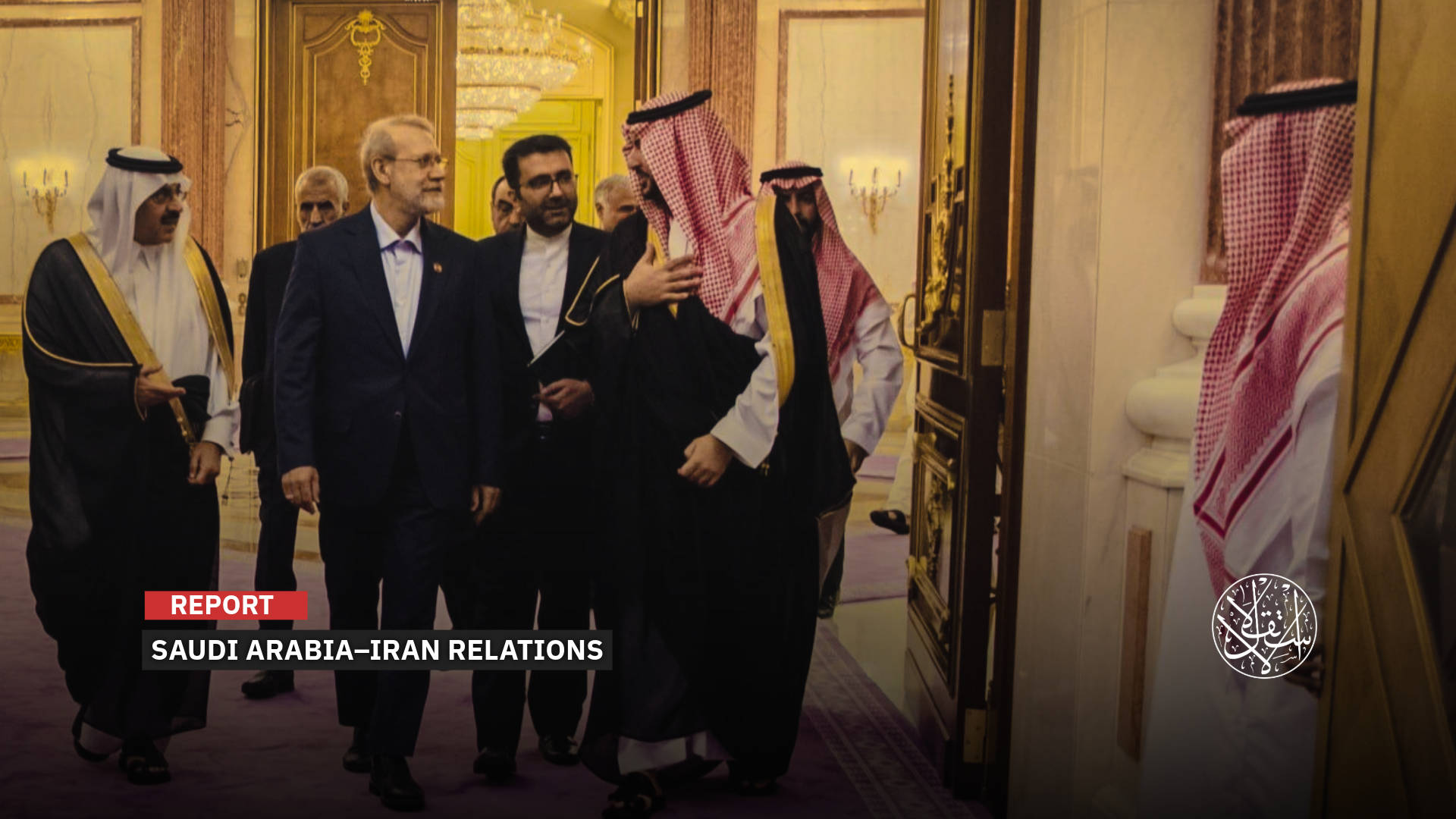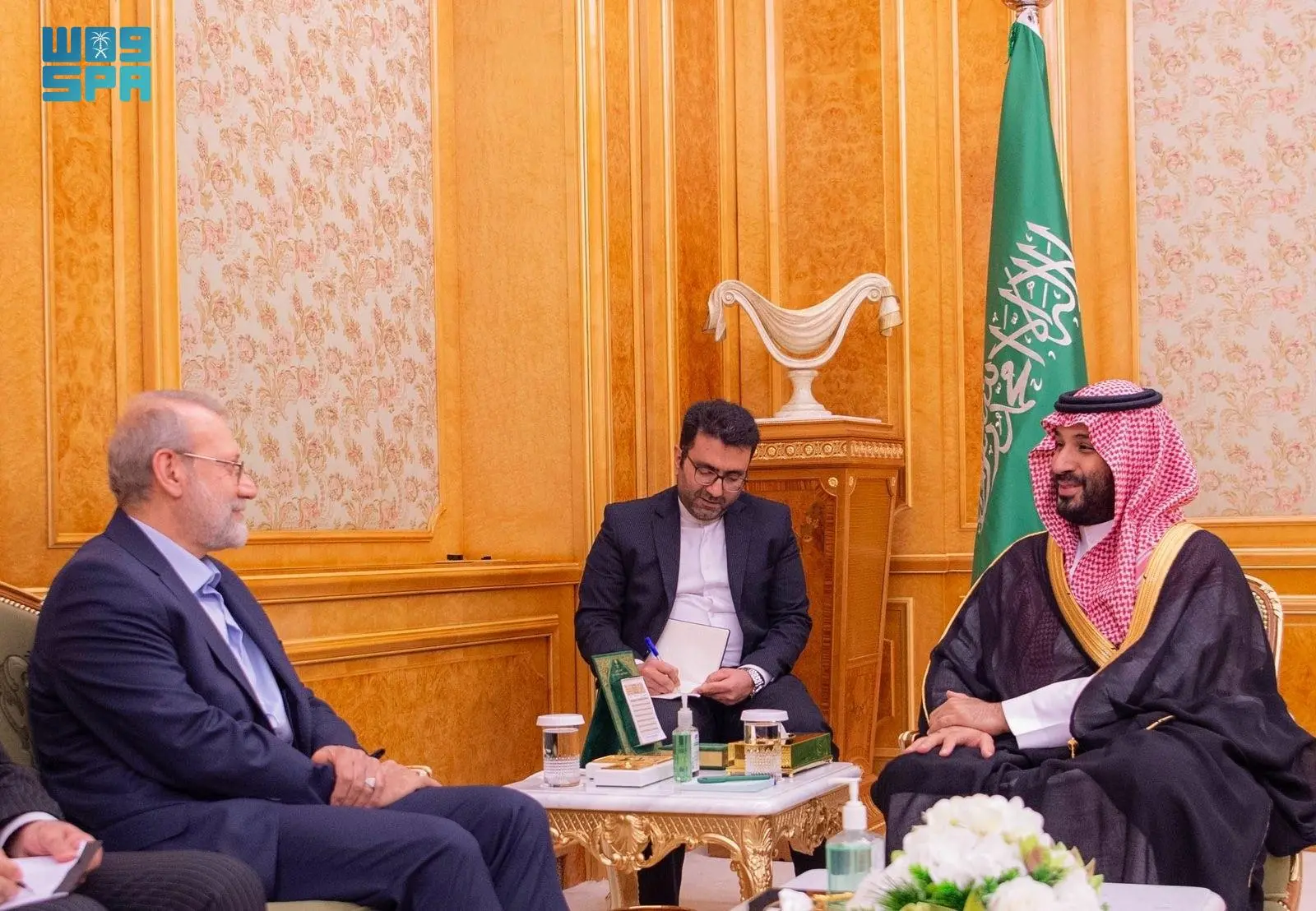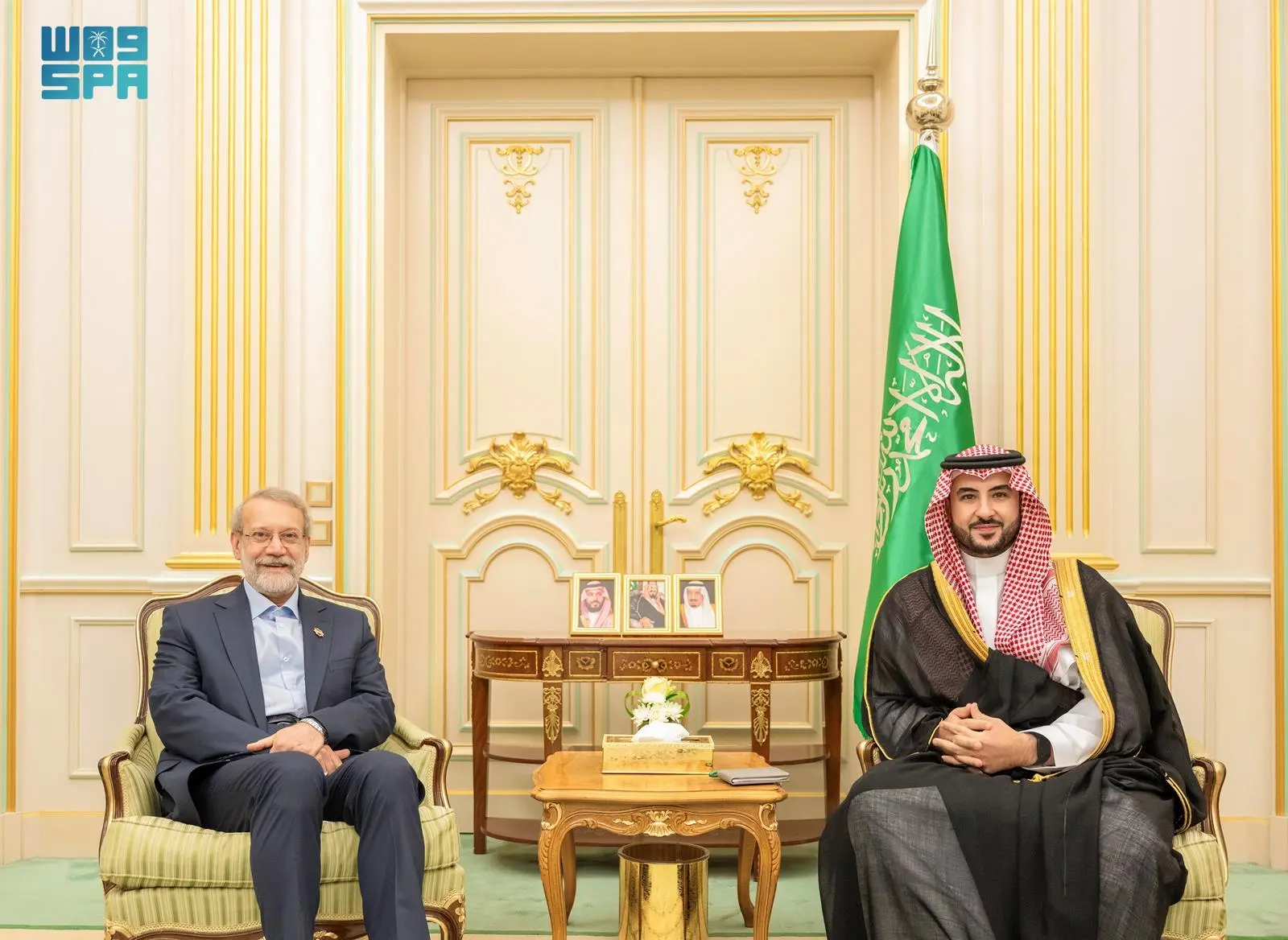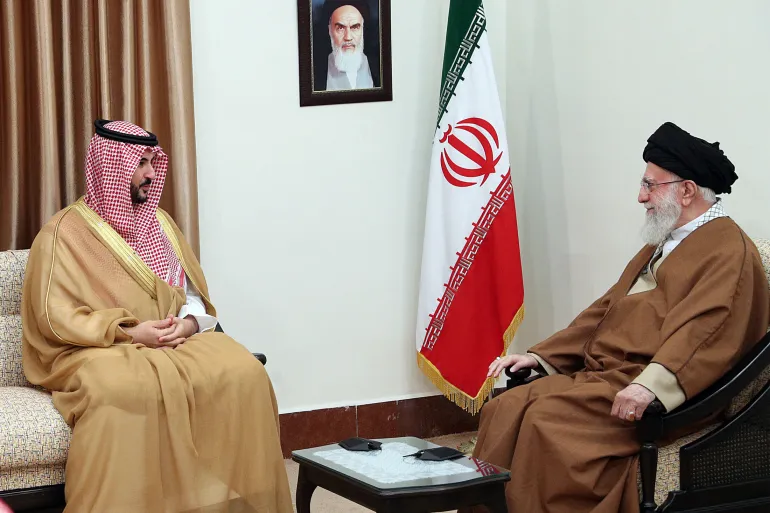After Israeli Aggression on Qatar, Will Larijani’s Riyadh Visit Spark Defense Cooperation?

Larijani said defense cooperation between the two countries would take a more structured form in the future.
Amid rising tensions in the Middle East, punctuated by “Israel’s” September 9, 2025 aggression on Qatar, Iran turned toward Saudi Arabia in search of defense cooperation, raising fundamental questions about whether the two sides could move closer.
Since the events of October 7, 2023, the Iranian axis has absorbed heavy blows, including a June 13, 2025, Israeli aggression on Iran backed by Washington, which Tehran answered with 12 days of missile fire on the Israeli Occupation territory before a cease-fire took hold.

Defense Cooperation
One day after the emergency meeting of Arab and Islamic states in Doha on the aggression against Qatar, Ali Larijani, secretary of Iran’s Supreme National Security Council, paid a one-day visit to Riyadh on September 16, where he met Crown Prince Mohammed bin Salman and Defense Minister Khalid bin Salman.
Larijani said his meeting with the crown prince confirmed that economic and security cooperation between the two countries will expand in a more organized manner.
He also stated that discussions with Mohammed bin Salman covered removing barriers to economic cooperation, consultations on regional coordination, and possible measures to secure stability in the Middle East.
On strengthening ties in other fields, Larijani said, “It has been agreed that these efforts will be pursued through working groups, which, God willing, will take on a more organized structure in the future.”
Asked whether the Israeli Occupation aggression on Qatar had shifted Arab leaders’ strategic outlook, he replied, “Our Saudi friends already had a relatively clear view of these developments, and now it has become much clearer.”
“Countries across the region now more tangibly perceive the validity of Iran's long-held position that an adventurous element in the region prevents stability from being achieved,” Larijani added.
IRNA reported that Larijani and Mohammed bin Salman also discussed the future of the region and the situation in Islamic countries more broadly.
For its part, Saudi state news agency SPA said the Riyadh meeting reviewed bilateral relations and regional developments but offered no further details. SPA also reported on Larijani’s meeting with Defense Minister Khalid bin Salman, which covered regional dynamics and ongoing efforts to promote security and stability.
Larijani was accompanied by Ali Bagheri Kani, deputy for international affairs at the Supreme National Security Council, and Mohammad Ali Bek, deputy foreign minister for Gulf affairs.

A New Path
On September 17, the Iranian daily Farhikhtegan reported that a shift in Saudi Arabia’s stance could prove highly advantageous for Lebanon’s political trajectory and for efforts to contain “Israel’s” regional expansion.
The paper added that if Larijani manages to influence Riyadh’s outlook, the result could be significant, noting that Iran now has an opening to bargain and shift Arab perspectives, including that of Saudi Arabia. Such a change, it argued, could correct past miscalculations about regional events—or at least alert Arab capitals that persisting on the wrong path will weaken their own regional strength.
The editorial said “Israel’s” aggression on Doha had sounded an alarm across the Arab world, proving that whenever “Israel” feels its interests are threatened, it will not hesitate to violate the rights of these countries. Tehran, it added, can use this moment to warn Riyadh of the dangers of aligning with Washington’s project to disarm Hezbollah and weaken the broader “axis of resistance.” Larijani’s visit, it concluded, could enhance Iran’s leverage on multiple levels.
Echoing that assessment, the outlet Iranian Diplomacy argued that the trip was driven not only by Saudi Arabia’s role as the Arab world’s largest economy but also by its central place in regional security dynamics. With both Tehran and Riyadh seeking to redefine their relations after years of hostility, the visit could mark a turning point from draining rivalry to strategic cooperation.
The site asked whether Larijani’s talks in Riyadh could open “a new path” toward sustainable, multilayered security in the Middle East, even as the presence of external powers, particularly the United States and the Israeli Occupation, continues to weigh heavily on the process.
It noted that Larijani’s stop in Riyadh followed his earlier missions to Baghdad and Beirut in August, describing Saudi Arabia as the “third corner” of a security triangle. The kingdom’s unique standing in Middle East geopolitics, the article argued, gives Iran a chance to help shape a new framework for regional cooperation.
The report added that Tehran’s shift from a single-minded focus on military deterrence to an active, multidimensional diplomacy—encompassing politics, economics, security, and energy—was becoming clear through such visits. Larijani’s agenda in Riyadh, it said, spans regional files from Yemen to Lebanon to Gulf security, with defense-level dialogue seen as a potential step to reduce mistrust and create mechanisms for better crisis management.

Containing Threats
As for whether Tehran and Riyadh could reach meaningful defense cooperation, Middle East analyst Nadir Mohammed dismissed the idea that Ali Larijani’s talks in Saudi Arabia would produce agreements capable of deterring the Israeli Occupation or repelling external attacks.
In comments to Al-Estiklal, Mohammed said the discussions were more likely to ease tensions between the two countries and reduce regional frictions in places such as Yemen and Lebanon, where Iran holds sway. Tehran, he suggested, could pledge to calm external fronts by restraining Houthi forces in Yemen and the Popular Mobilization Units in Iraq while refraining from targeting Saudi interests. He added that Iran’s broader calculation is to ensure Riyadh does not become a party to any future aggression on the Islamic Republic.
Iranian writer Qasem Ghafari offered a more optimistic view. Writing in the conservative daily Siasat-e-Rooz on September 17, he described Larijani’s meetings with Crown Prince Mohammed bin Salman and Defense Minister Khalid bin Salman as a significant step toward strengthening strategic cooperation. The visit, he noted, came after the March 2023 resumption of diplomatic ties and sought to open broad channels of engagement, with a priority on regional security and countering shared threats.
The last rupture in relations had come in 2016, when Iranian protesters torched the Saudi embassy in Tehran and its consulate in Mashhad following Riyadh’s execution of Shiite cleric Nimr al-Nimr. That standoff ended in March 2023, when the two countries, after five rounds of talks in Baghdad and Oman, announced in Beijing, under Chinese mediation, that they would restore diplomatic ties.
Ghafari argued that mounting challenges across West Asia, from “Israel’s” ongoing aggression to Washington’s lack of active engagement, make coordination between Tehran and Riyadh a pressing need for stability. Military cooperation, he wrote, could provide a framework to confront terrorist, Israeli, and American threats, while laying the groundwork for sustainable regional security.
Larijani’s trip, he concluded, reflected Iran’s new pragmatism and flexibility—an effort to build effective regional alliances by leveraging local capacities and multilateral cooperation to achieve layered and lasting security.
In a similar vein, the conservative daily Alquds wrote on September 17 that the visit could lay the foundation for regional collaboration, describing Iran as a “security pillar” in the face of the Zionist enemy [the Israeli Occupation] that destabilizes security, at a moment when many expect the region could slide into military confrontation.
Sources
- Larijani’s Riyadh Visit: Laying the Groundwork for New Regional Security Order
- Defense ties with Saudi Arabia set to strengthen: Iran security chief
- From the Iranian Press: What Are the Implications of Larijani’s Visit to Saudi Arabia? [Arabic]
- Riyadh: The Third Pillar of Tehran’s Security Puzzle [Persian]
- Larijani in Saudi Arabia, the Education Crisis, Officials’ Vast Wealth, and the Shrinking Caspian Sea [Arabic]
- Politics: Crown Prince Receives Secretary of Iran’s Supreme National Security Council [Arabic]
- Politics: Minister of Defense Meets Secretary of Iran’s Supreme National Security Council [Arabic]










